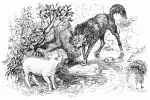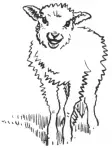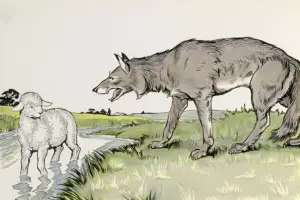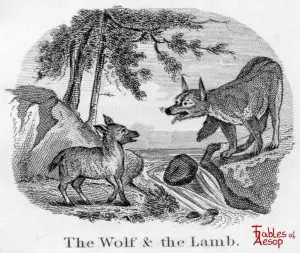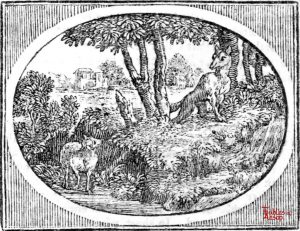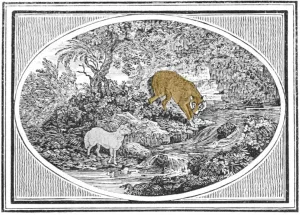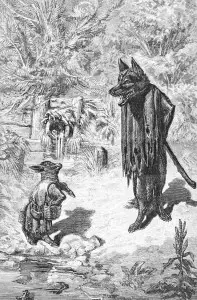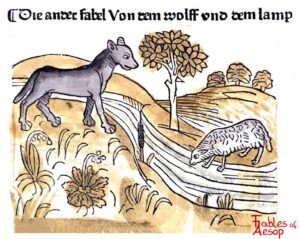Tyrants need no excuse. A Wolf catches a Lamb by a river and argues to justify killing it. Doesn’t matter as the Wolf needs no excuse.
Tyrants need no excuse.

Eliot/Jacobs Version
A Wolf was drinking at a spring on a hillside. On looking up he saw a Lamb just beginning to drink lower down. “There’s my supper,” thought he, “if only I can find some excuse to seize it.” He called out to the Lamb, “How dare you muddle my drinking water?”
“No,” said the Lamb; “if the water is muddy up there, I cannot be the cause of it, for it runs down from you to me.”
“Well, then,” said the Wolf, “why did you call me bad names this time last year?”
“That cannot be,” said the Lamb; “I am only six months old.”
“I don’t care,” snarled the Wolf; “if it was not you, it was your father;” and with that he rushed upon the poor little Lamb and ate her all up.

Caldecott
A Wolf seeing a Lamb drinking at a brook, took it into his head that he would find some plausible excuse for eating him. So he drew near, and, standing higher up the stream, began to accuse him of disturbing the water and preventing him from drinking.
The Lamb replied that he was only touching the water with the tips of his lips; and that, besides, seeing that he was standing down stream, he could not possibly be disturbing the water higher up. So the Wolf, having done no good by that accusation, said: “Well, but last year you insulted my Father.” The Lamb replying that at that time he was not born, the Wolf wound up by saying: “However ready you may be with your answers, I shall none the less make a meal of you.”

Aesop For Children
A stray Lamb stood drinking early one morning on the bank of a woodland stream. That very same morning a hungry Wolf came by farther up the stream, hunting for something to eat. He soon got his eyes on the Lamb. As a rule Mr. Wolf snapped up such delicious morsels without making any bones about it, but this Lamb looked so very helpless and innocent that the Wolf felt he ought to have some kind of an excuse for taking its life.
“How dare you paddle around in my stream and stir up all the mud!” he shouted fiercely. “You deserve to be punished severely for your rashness!”
“But, your highness,” replied the trembling Lamb, “do not be angry! I cannot possibly muddy the water you are drinking up there. Remember, you are upstream and I am downstream.”
“You do muddy it!” retorted the Wolf savagely. “And besides, I have heard that you told lies about me last year!”
“How could I have done so?” pleaded the Lamb. “I wasn’t born until this year.”
“If it wasn’t you, it was your brother!”
“I have no brothers.”
“Well, then,” snarled the Wolf, “It was someone in your family anyway. But no matter who it was, I do not intend to be talked out of my breakfast.”
And without more words the Wolf seized the poor Lamb and carried her off to the forest.
Moral
The tyrant can always find an excuse for his tyranny.
The unjust will not listen to the reasoning of the innocent.

Jefferys Taylor
A WOLF and lamb once chanced to meet
Beside a stream, whose waters sweet
Brought various kinds of beasts together,
When dry and sultry was the weather;
Now though the wolf came there to drink,
Of eating he began to think,
As soon as near the lamb he came,
And straight resolved to kill the same;
Yet thought it better to begin
With threat’ning words and angry mien.
“And so,” said he to him below,
“How dare you stir the water so?
Making the cool refreshing flood
As brown as beer, and thick as mud.”
“Sir,” said the lamb, “that cannot be,
The water flows from you to me;
So, ’tis impossible, I think,
That what I do can spoil your drink.”
“I say it does, you saucy puss:
How dare you contradict me thus?
But more than this, you idle clack,
You rail’d at me behind my back
Two years ago, I have been told;”
“How so? I’m not a twelvemonth old,”
The lamb replied; “so I suspect
Your honour is not quite correct.”
“If not, your mother it must be,
And that is all the same to me,”
Rejoin’d the wolf—who waited not,
But kill’d and ate him on the spot.
Some, like the wolf, adopt the plan
To make a quarrel if they can;
But none with you can hold dispute
If you’re determined to be mute;
For sure this proverb must be true,
That ev’ry quarrel must have two.

Samuel Croxall
ONE hot, sultry day, a Wolf and a Lamb happened to come, just at the same time, to quench their thirst in the stream of a clear silver brook, that ran tumbling down the side of a rocky mountain. The Wolf stood upon the higher ground; and the Lamb at some distance from him down the current. However, the Wolf, having a mind to pick a quarrel with him, asked him, What he meant by disturbing the water, and making it so muddy that he could not drink; and, at the same time demanded satisfaction. The Lamb, frightened at this threatening charge, told him, in a tone as mild as possible, That, with humble submission, he could not conceive how that could be; since the water which he drank ran down from the Wolf to him, and therefore it could not be disturbed so far up the stream. Be that as it will, replies the Wolf, you are a rascal, and I have been told that you treated me with ill language behind my back, about half a year ago. Upon my word says the Lamb, the time you mention was before I was born. The Wolf, finding it to no purpose to argue any longer against truth, fell into a great passion, snarling and foaming at the mouth, as if he had been mad; and drawing nearer to the Lamb, Sirrah, says he, if it was not you it was your father, and that’s all one.—So he seized the poor, innocent, helpless thing, tore it to pieces, and made a meal of it.
THE APPLICATION
The thing which is pointed at in this fable is so obvious, that it will be impertinent to multiply words about it. When a cruel, ill-natured man has a mind to abuse one inferior to himself, either in power or courage, though he has not given the least occasion for it, how does he resemble the Wolf! whose envious, rapacious temper could not bear to see innocence live quietly in its neighbourhood. In short, wherever ill people are in power, innocence and integrity are sure to be persecuted; the more vicious the community is, the better countenance they have for their own villanous measures: to practise honesty, in bad times, is being liable to suspicion enough; but if any one should dare to prescribe it, it is ten to one but he would be impeached of high crimes and misdemeanors: for, to stand up for justice in a degenerate and corrupt state, is tacitly to upbraid the government; and seldom fails of pulling down vengeance upon the head of him that offers to stir in its defence. Where cruelty and malice are in combination with power, nothing is so easy as for them to find a pretence to tyrannize over innocence, and exercise all manner of injustice.

Thomas Bewick (The Wolf and The Lamb)
One hot sultry day, a Wolf and a Lamb happened to come just at the same time, to quench their thirst in the stream of a brook that fell tumbling down the side of a rocky mountain. The Wolf stood upon the higher ground, and the Lamb at some distance below him. However, the Wolf, having a mind to pick a quarrel with the Lamb, asked him what he meant by disturbing the water, and making it so muddy that he could not drink? and, at the same time, demanded satisfaction. The Lamb, frightened at this threatening charge, told him, in a tone as mild as possible, that with humble submission, he could not conceive how that could be, since the water which he drank ran down from the Wolf to him, and therefore could not be disturbed so far up the stream. Be that as it may, replies the Wolf, you are a rascal, and I have been told that you used ill language concerning me behind my back, about half a year ago. Upon my word, says the Lamb, the time you mention was before I was born. The Wolf, finding it to no purpose to argue any longer against truth, fell into a great passion, snarling and foaming at the mouth as if he had been mad; and drawing nearer to the Lamb, Sirrah, says he, if it were not you, it was your father, and that is the same. So he seized the poor innocent helpless thing, tore it to pieces, and made a meal of it.
APPLICATION.
Where'er oppression rules, fell Wolves devour; And the worst crimes are want of strength and pow'r.
They who do not feel the sentiments of humanity, will seldom listen to the voice of reason; and when cruelty and injustice are armed with power, and determined on oppression, the strongest pleas of innocence are preferred in vain, and nothing is more easy than finding pretences to criminate the unsuspecting victims of tyranny. How many of the degenerate, corrupt, and arbitrary governments with which the civilized world has been disfigured, have exercised their vengeance upon the honest and virtuous, who have dared in bad times to speak the truth; and how many men in private life are to be met with, whose wolfish dispositions, and envious and rapacious tempers cannot bear to see honest industry rear its head!

Townsend Version
Wolf, meeting with a Lamb astray from the fold, resolved not to lay violent hands on him, but to find some plea to justify to the Lamb the Wolf’s right to eat him. He thus addressed him: “Sir, last year you grossly insulted me.” “Indeed,” bleated the Lamb in a mournful tone of voice, “I was not then born.” Then said the Wolf, “You feed in my pasture.” “No, good sir,” replied the Lamb, “I have not yet tasted grass.” Again said the Wolf, “You drink of my well.” “No,” exclaimed the Lamb, “I never yet drank water, for as yet my mother’s milk is both food and drink to me.” Upon which the Wolf seized him and ate him up, saying, “Well! I won’t remain supperless, even though you refute every one of my imputations.”
Moral
The tyrant will always find a pretext for his tyranny.

JBR Collection
A hungry Wolf one day saw a Lamb drinking at a stream, and wished to frame some plausible excuse for making him his prey. “What do you mean by muddling the water I am going to drink?” fiercely said he to the Lamb. “Pray forgive me,” meekly answered the Lamb; “I should be sorry in any way to displease you, but as the stream runs from you towards me, you will see that such cannot be the case.” “That’s all very well,” said the Wolf; “but you know you spoke ill of me behind my back a year ago.” “Nay, believe me,” replied the Lamb, “I was not then born.” “It must have been your brother then,” growled the Wolf. “It cannot have been, for I never had any,” answered the Lamb. “I know it was one of your lot,” rejoined the Wolf, “so make no more such idle excuses.” He then seized the poor Lamb, carried him off to the woods, and ate him.

L’Estrange Version
As a wolf was lapping at the head of a fountain, he spy’d a lamb, paddling at the same time, a good way off down the stream. The wolf had no sooner the prey in his eye, but away he runs open-mouth to’t. Villain (says he), how dare you lye muddling the water that I’m a drinking? Indeed, says the poor lamb, I did not think that my drinking there below, could have foul’d your water so far above. Nay, says t’other, you’ll never leave your chopping of logick till your skin’s turn’d over your ears, as your fathers was, a matter of six months ago, for prating at this sawcy rate; you remember it full well, sirrah. If you’ll believe me, sir, (quoth the innocent lamb, with fear and trembling) I was not come into the world then. Why thou impudence, cries the wolf, hast thou neither shame, nor conscience? But it runs in the blood of your whole race, sirrah, to hate our family; and therefore since fortune has brought us together so conveniently, you shall e’en pay some of your fore-fathers scores before you and I part; and so without any more ado, he leapt at the throat of the miserable helpless lamb, and tore him immediately to pieces.
Moral
‘Tis an easie matter to find a staff to beat a dog. Innocence is no protection against the arbitrary cruelty of a tyrannical power: but reason and conscience are yet so sacred, that the greatest villanies are still countenanc’d under that cloak and color.

Crane Poetry Visual
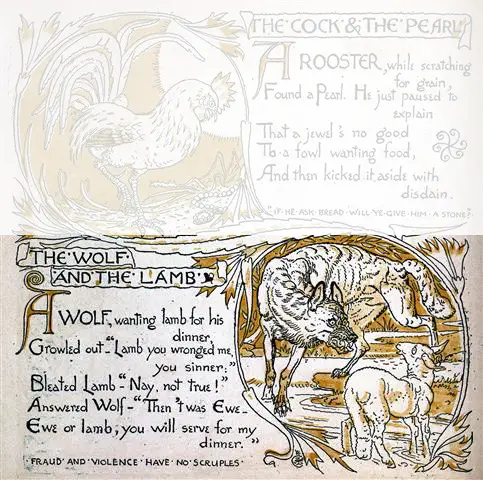
A Wolf, wanting lamb for his dinner,
Growled out “Lamb you wronged me, you sinner;”
Bleated Lamb – “Nay, not true!”
Answered Wolf – “Then ’twas Ewe…
Ewe or lamb; you will serve for my dinner.”
Fraud and violence have no scruples.

Heinrich Steinhöwel (Of the Wolf and the Lamb)

Agnus et Lupus, Bibentes
Lupus et agnus, siti compulsi, ad eundem rivum venerant. Superior lupus, longe inferior agnus stabat. Tunc improbus latro, iurgii causam quaerens, “Cur,” inquit, “aquam mihi bibenti turbulentam fecisti?” Agnus, perterritus, “Quomodo,” inquit, “hoc facere possum? Aqua a te ad me decurrit.” Lupus, veritate rei repulsus, “Sex menses abhinc,” inquit, “mihi maledixisti.” “Illo tempore,” respondit agnus, “equidem nondum natus eram.” “Hercle igitur,” inquit lupus, “pater tuus de me male locutus est!” Atque ita correptum agnum dilaniat.
Perry #155

